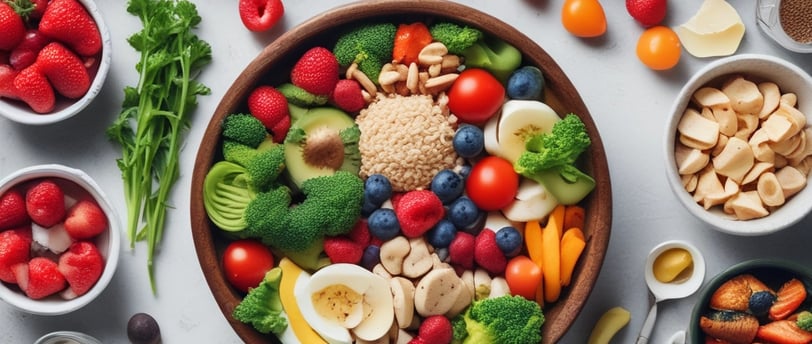Nutrition Tips for a Healthier Diet
Tired of complicated diet rules and conflicting nutrition advice? Let's get back to basics. Making healthier food choices doesn't mean giving up the foods you love or following restrictive eating plans. Instead, it's about making small, sustainable changes that nourish your body and fit your lifestyle.
NUTRITION AND DIET
12/9/20242 min read


Essential Nutrition Tips for a Healthier Diet
Getting the Hang of Balanced Nutrition
Balanced nutrition is key to a healthy diet, focusing on the right mix of macronutrients: carbs, proteins, and fats. Each of these is crucial for how our bodies work, giving us energy, helping build tissues, and keeping our cells healthy.
Mixing in a range of vitamins and minerals from fruits, veggies, whole grains, and lean proteins helps your body get the vital nutrients it needs to stay healthy and feel great.
Incorporating Whole Foods into Your Daily Meals
Whole foods like fruits, veggies, nuts, seeds, whole grains, and lean meats are super nutritious and not heavily processed. Adding these to your meals not only makes them tastier but also ramps up your nutrient intake.
When you plan your meals with whole foods, you can enjoy better health benefits, such as improved digestion, more energy, and a reduced chance of chronic illnesses. Consider replacing processed snacks with fresh fruit or whole grain choices to really boost your diet.
The Importance of Hydration for Optimal Health
Keeping yourself well-hydrated is super important for your overall health. Water plays a key role in regulating your body temperature, helping with digestion, and ensuring your body absorbs nutrients properly, which is vital for everything to work smoothly.
Try to drink around eight 8-ounce glasses of water each day, and bump that up if you’re exercising a lot or it’s really hot outside. You can also add hydrating foods like cucumbers, oranges, and soups to help meet your daily fluid needs.
Mindful Eating: Cultivating Awareness at Mealtime
Mindful eating is all about being fully present while you eat and drink, really tuning into the tastes, textures, and smells of your meals. This approach can help you build a better relationship with food and avoid overeating.
When you take your time and enjoy every bite, you become more aware of when you're hungry or full, which can lead to smarter food choices and better digestion.
Building a Sustainable Meal Plan for Long-Term Success
Crafting a meal plan that fits your lifestyle and tastes is super important for sticking to a healthy diet in the long run. First, take a look at what you need to eat, how you like to cook, and what foods you really enjoy.
Mixing things up in your meal plan helps keep it interesting and makes sure you're getting all the nutrients you need. Think about prepping some meals in advance to make life easier during those hectic weeks and to help you stay focused on your nutrition goals.
